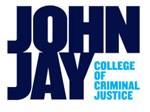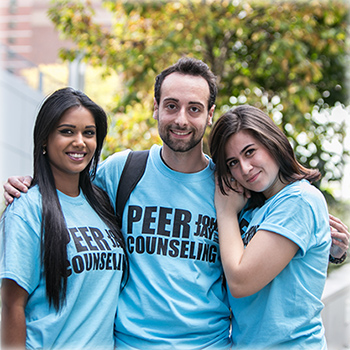 Peer Programs Make a World of Difference
Peer Programs Make a World of Difference
While there are many opportunities at John Jay that allow students to engage with the college community, few students have as much impact as those working in the peer programs.
Each of the eight individual peer programs at John Jay has a unique mission and provides students with professional work experience while giving them the chance to engage with their classmates in important and meaningful ways. The peer programs include: Peer Mentors, Peer Career Educators, Peer Counselors, Peer Advocates, the Yellow Shirts, Peer Advisors, Gender Justice Advocates, and Peer Ambassadors. Each operates out of a different office at John Jay, but they share the common goal of providing essential opportunities for peer development.
Students working with the peer programs come from a variety of backgrounds and experience levels, but they share a common attribute: They are among the most passionate, active and engaged students on campus. Whether it’s guiding freshmen through their first few days of college, helping a student refine their resume, or simply being available when a student needs someone to talk to, students in the peer programs are making an impact on the John Jay community. Meet a few of those students:
Success through Involvement
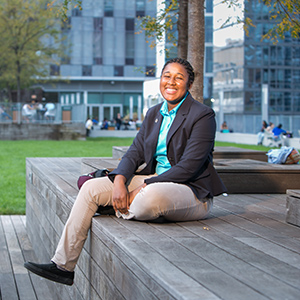 When Jessica Jean first came to John Jay, she was told that the best path to success was getting involved on campus. She took that advice to heart, and today she is a campus leader with the Peer Ambassador program.
When Jessica Jean first came to John Jay, she was told that the best path to success was getting involved on campus. She took that advice to heart, and today she is a campus leader with the Peer Ambassador program.
As part of her duties Jean provides informative tours to prospective students. She also continues to support students on campus, making sure they have someone to talk to when challenges arise. She observed, “I can say, ‘Look at me I’m going to class and studying, but I also have a job and am making money, you can do this too.’”
A senior studying educational psychology and communications, Jean said that a lot of her work entails instilling confidence in students who know they want to succeed, but might not be aware of the opportunities offered at John Jay. “I tell students that when I was in my first year, I didn’t know what I wanted to do, but I wanted to be a better version of myself,” she recalled. “I couldn’t be shy and stay in back of the room. So I took a public speaking course to break out of my shell, and that developed into talking to more students and learning about more opportunities on campus.”
She said that she wouldn’t have known about many of the opportunities that have made her a leader on campus without the peer program. “A lot of opportunities go under the radar or aren’t advertised much,” she said, “and I wouldn’t have applied to certain scholarships without hearing about it from someone in the peer program.”
In addition to working as a Peer Ambassador, Jean plays on the women’s soccer team and is the current president of the Student-Athlete Advisory Committee. She won a John Jay-Vera Fellowship to intern at an organization that helps formerly incarcerated individuals obtain their high school equivalency diplomas.
Jean grew up in New York City, and although she considered several different career paths, including joining the Army, she now hopes to work in higher education in a mentoring or counseling position. “I love the college atmosphere,” she said, “the people who work here love their job, are passionate about the campus, and are making change and building that community. It’s an exciting atmosphere to be in.” She recently accepted a position with Teach for America, and after graduating in May 2017 she will spend the next two years teaching at a New York City high school.
“The peer program is important because it’s selective and there’s a sense of power that comes with knowing you’re in an elite group that can make change. You can be the voice for people that are scared to speak up, and you’re not only helping yourself, you’re helping your community and those you identify with.”
The Importance of Empowerment
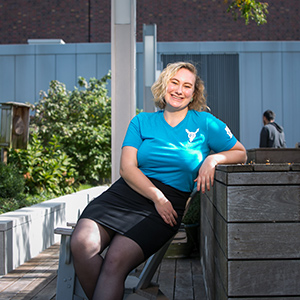 Ella Merriwether, a sophomore Forensic Psychology major, has a favorite analogy. “Gender is like air,” she said, “it’s all around us but we don’t think about it unless somebody threatens it.”
Ella Merriwether, a sophomore Forensic Psychology major, has a favorite analogy. “Gender is like air,” she said, “it’s all around us but we don’t think about it unless somebody threatens it.”
Merriwether is a Peer Gender Justice Advocate on campus who works in the Women’s Center to promote gender justice, combat sexual violence and assault, and provide safe spaces for people on campus. She also works to promote gender-neutral bathrooms on campus, making sure that people know where they are and how to alert management if they have any problems. “We’re trying to expand this but were also proud of what we’ve accomplished,” she said.
This fall, Merriwether helped put together a sexual consent workshop in collaboration with the New York City Alliance Against Sexual Assault, in which she worked to create an open dialogue on safe sex and healthy relationships. Organizing events is a key part of her role in the Peer program, and next semester Merriwether says she plans to help stage a larger event involving CUNY professors and staff on safe-space training. “The most important thing about being a Gender Justice Advocate is that I get to learn, and I’m not only learning about gender. I also learn about professional development and planning events, and I get to create connections with people,” she said.
When asked how she became a Gender Justice Advocate, Merriwether responded: “I’m a woman, and I’ve just been raised by some powerful female figures in my life. I think it’s important to further empower people, and to expand your knowledge base,” she said. “It’s important to listen, to understand other peoples struggles and how they differ from my own, and to still advocate and encourage.”
Merriwether, who is originally from the Philadelphia area, hopes to continue in academia and pursue a doctorate in clinical psychology. “I think that it’s important to do the best that you can in embodying gender justice, because if we always assume someone else will handle it, then nothing will change,” she said.
Confidence Booster
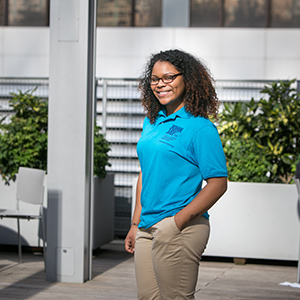 “If you don’t know where to start, start at the career center.” That’s the advice of Denise Pazmino, a sophomore majoring in Public Administration, and a Peer Career Educator. Pazmino has been working at the Center for Career and Professional Development since last April, and says she loves the job because every day is something new.
“If you don’t know where to start, start at the career center.” That’s the advice of Denise Pazmino, a sophomore majoring in Public Administration, and a Peer Career Educator. Pazmino has been working at the Center for Career and Professional Development since last April, and says she loves the job because every day is something new.
“I like working with the students because everyone is different and has their own story,” she said. “Some people are excited while others are very timid, so it’s interesting to see all the different John Jay students in and out of the office all day.” According to Pazmino, the career center can help students contact potential employers about finding jobs, internships, community service work, volunteer work, and can help students navigate any other career-related questions or problems they may have.
“If a student comes in and they need help finding a job or an internship, I’ll sit down with them and asks questions about what they’re interested in, their hobbies, their career ambitions, and we’ll work from there to figure out what’s best for them,” Pazmino said.
Pazmino stressed that the career center is a great outlet for students who are confused or indecisive, or simply don’t know how to apply their major to a career. She recalled one student who came in because she wasn’t happy with her resume. After working with the student to improve her resume and boost her self-confidence, she later saw the student approaching several booths at a John Jay job fair and talking with employers. The student returned to the career center a few weeks later to thank Pazmino and tell her that she had received some callbacks from employers.
Pazmino, a Staten Island resident, says that working as a Peer Career Counselor has influenced her to pursue student counseling as a profession, and she hopes to obtain a graduate degree in that field. “I definitely recommend peer programs to any student looking for a way to get involved,” she said. “It’s a great way to meet other John Jay students and find out about the resources on campus.”
Driven to Help
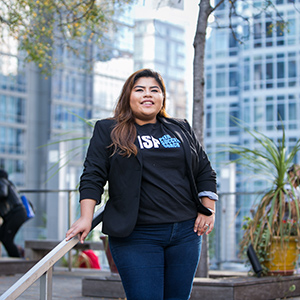 Few moments in a student’s life can be more intimidating than the first day of college, and Claudia Holguin knows this first hand. As a SASP Peer Success Coach, Holguin works on a team of mentors who are paired up with first year and transfer students, helping to ease the transition and allow those students to make the most out of their time at John Jay.
Few moments in a student’s life can be more intimidating than the first day of college, and Claudia Holguin knows this first hand. As a SASP Peer Success Coach, Holguin works on a team of mentors who are paired up with first year and transfer students, helping to ease the transition and allow those students to make the most out of their time at John Jay.
“We serve as their guide throughout their whole academic journey at John Jay. Professionally, academically, and personally,” Holguin said.
Holguin, a sophomore and double major in criminology and Latin American studies, is the Peer Success coach for Adelante, a program that supports Latinx students and students who are interested in Latinx issues, which she has been a member of since she first began at John Jay. “I always had a drive to help people,” she said, “and I knew I could use my own experience to help other students because the transition from high school to college isn’t easy.”
Holguin first came to John Jay as a junior in high school as part of the College Now program under the tutelage of professor Nancy Yang, the Associate Director for Student Success Initiatives, and the two stayed in touch. After having a success coach of her own and understanding firsthand the benefits they can bring to a student’s life, Holguin decided she wanted to pay it forward. “I was inspired by the success coach I had,” she said, “so I decided to follow in their steps.”
But before Holguin was studying criminology, she was actually a performer. Holguin was born and raised in the Bronx, and attended a professional performing arts school before joining a theater program at MCC Theater. “We wrote and performed our own pieces, many of which were about social justice,” she said, “So that helped me open up to the world of social justice, and drove me to advocate for Latino and minority rights.”
Holguin recognized her new calling and enrolled in John Jay, where she became involved in Adelante and then SASP, where she continues to mentor students and help them find their own path to success.
“The thing I love about my job is I learn something new everyday because of my students, and I take that very seriously,” she said. “I’m willing to learn from them, and it made me realized that helping people is what I want to do for the rest of my life.”
How to Get Help
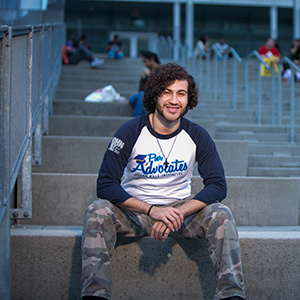 “Incoming freshmen have this idea that being a college student is about doing it all on their own, because there’s this newfound freedom, “ said Ryan Goitia, “but part of college is actually asking for help.”
“Incoming freshmen have this idea that being a college student is about doing it all on their own, because there’s this newfound freedom, “ said Ryan Goitia, “but part of college is actually asking for help.”
Goitia is a Peer Advocate with the Urban Male Initiative, and a former Peer Ambassador, and like others in the peer programs, he got involved because of a fundamental instinct for helping others.
“The first thing I tell them is that if you need help, seek it out, ” Goitia said, “because there are so many resources available, like the tutoring center, the Math and Science Resource Center and the Writing Center, or even little things like going to see professors during their office hours or how to find opportunities for on-campus jobs.”
Goitia, who was born in the Bronx and raised in Yonkers, said he doesn’t remember getting much guidance as a freshman. “I was floating in the wind,” he said. This began to change during his sophomore year, when he discovered UMI and became more involved on campus. Since then, he has worked with UMI as a Peer Ambassador and with CUNY Service Corps for the Office of Community Outreach and Service Learning. Currently, he works in the Bronx as an intern for an organization called Global Kids. He hasn’t forgotten those who have helped him along the way, and said that he “wanted to pass that knowledge along.”
A senior majoring in Forensic Psychology, Goitia says he’s interested in how people think and behave, and in uncovering how the mind works. After college he hopes to go into social work, and aspires to become a director for a program working with LGBTQ youth. These aspirations, Goitia says, are directly linked to the positive experience he’s had helping others through the peer programs.
Among the lessons he’s learned during his time as a Peer Advocate and Ambassador, Goitia said, is to be patient with people. “You can’t expect them to be ready for the lessons you have to give them all at once,” he said. “As a mentor, I have to be aware of where my proteges are in their development.”
In his opinion, one of the most important functions of UMI and the peer programs is providing a network. “My favorite part of the job is connecting people and sharing my network with others,” he said. “We’re all one big resource helping students to get what they need.”
